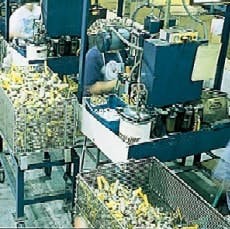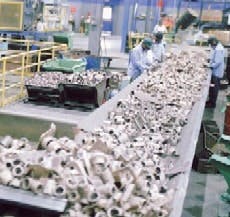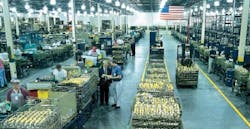Conbraco Industries Inc. has four facilities: a brass foundry/machining facility in Pageland, S.C.; an assembly/distribution facility in Pageland, S.C.; a steel foundry/machining plant in Conway, S.C.; a corporate headquarters and a plumbing/heating line of products in Matthews, N.C. The company manufactures, finishes and assembles brass and steel ball valves. Conbraco has been in business since 1928, serving all industries with a primary focus on the petroleum and pulp and paper industries. Carroll Jenkins, Conbraco’s facilities manager, began looking at energy costs in an effort to be more competitive. At the same time, he was introduced to an organization called the South Carolina Manufacturing Extension Partnership (SCMEP) by Cheri McCoy, Chesterfield County economic development director. SCMEP is a nonprofit organization that helps South Carolina manufacturers solve business and supply-chain process problems. Last year alone, SCMEP reported an increase in sales by its manufacturing customers to the tune of $188.4 million, which is attributable to SCMEP’s assistance. SCMEP had just announced the availability of a grant from the U.S. Department of Energy (DOE) for metal casting manufacturers. The $178,400 grant was awarded to SCMEP to assist the state’s metal casting manufacturers with plant productivity improvements, profitability enhancement, and decreased energy consumption and waste.Conbraco qualified for participation in the DOE grant program. Charles Rampey, manufacturing consultant for SCMEP, conducted an energy assessment, walk-through audit, and compressed air leak survey in all South Carolina facilities. Rampey questioned billing methods on electrical bills and located numerous air leaks, many of which were in the brass foundry. SCMEP assisted Conbraco in correcting billing errors, installing capacitors to improve the power factor and repairing the compressed air leaks.
Assemblyline workers at Conbraco's brass foundry in Pageland S.C. sit at machinery with bins of ball valves next to them (left). Within a short time, thevalves are conveyed to other workers for sorting and inspection.The immediate results of billing corrections and capacitor installations was $110,000 annually toward Conbraco’s bottom line. The total impact of all work to-date is about $860,000. Ongoing projects include a sales tax review and a competitiveness review, SCMEP’s nationally recognized assessment tool used to analyze a facility and determine its limiting factors.“I couldn’t be happier with the results SCMEP has achieved by partnering with our company,” Jenkins says. “We plan to continue working with SCMEP’s manufacturing specialists to reduce energy costs, reduce waste and increase Conbraco’s bottom line.”After completion of the energy audit, SCMEP moved on to assess other methods in which it could save Conbraco time or add more dollars to the bottom line. SCMEP introduced executives from Johnson-Parsons & Associates, a sales tax recovery consulting company headquartered in Morganton, N.C., to Conbraco’s director of accounting operations, Pat Orman. Johnson-Parsons consultants say they have helped numerous companies identify and collect overpaid sales tax dollars since 1991, saving companies hundreds of thousands of dollars.Orman hired Johnson-Parsons on the spot, and the consultants went to work identifying vendors to whom Conbraco had overpaid sales taxes in the last three years, which is the state department of revenue’s statute of limitations. They reviewed both North Carolina and South Carolina accounts payable records during a period of about one month. To keep disruptions at the plant to a minimum, consultants were able to take 2001 and 2002 records offsite for review, leaving only 2003 records for onsite evaluation. Working hand in hand with Conbraco’s purchasing agent, Johnson-Parsons reviewed past invoices, looking for instances in which the manufacturer was charged up to 7% sales tax on manufacturing items that should have carried a 1% tax rate in North Carolina and a 0% rate in South Carolina. Consultants also looked for instances in which Conbraco overpaid taxes to state government when it purchased parts and supplies from vendors outside state lines.After identifying overpayments, Johnson-Parsons contacted each vendor to request repayment of overcharged sales taxes and managed the collection process. Historically, the company has a 98% collection rate and completes the collection process in about six months.
For as long as Conbraco Industries has been in business — since 1928 — it hasoperated this foundry/machining facility. The facility currently employs 1400 people and encompasses 190,880 square feet (office, plant and foundry).Johnson-Parsons identified $147,000 worth of tax overpayments for Conbraco and is in the process of collecting that amount from vendors. “We should be able to collect those overpayments, assuming all vendors are still in business,” Orman says. “These savings are pure profit for Conbraco, since the money was already spent and not previously considered refundable.”Dana W. Todd is marketing director for the South Carolina Manufacturing Extension Partnership (SCMEP). Contact her at (803) 463-5278 or [email protected].
All photos courtesy of Conbraco Industries Inc.
Two News Items of Note for Conbraco Industries
Brand-name expansion. Nearly five decades after it premiered on the first American-made commercial ball valve, the Apollo Valves brand-name is being expanded to cover all valve and accessory lines available from Conbraco Industries.Since its introduction in 1968, the Apollo nameplate has earned recognition for high quality and reliable performance among specifiers, contractors, installers and OEMs across many industrial and commercials applications. By applying the Apollo brand to all products, Conbraco officials hope to eliminate confusion in the marketplace and take full advantage of the good reputation associated with the name Apollo around the world."As proud as we are of the Conbraco tradition dating to 1928, the strength of the Apollo name has won the confidence of our customers more than any of our other brands," said Cal Mosack, Executive Vice President. "Moving to full Apollo branding is a natural progression and one the markets we serve will appreciate."
All photos courtesy of Conbraco Industries Inc.
Two News Items of Note for Conbraco Industries
Brand-name expansion. Nearly five decades after it premiered on the first American-made commercial ball valve, the Apollo Valves brand-name is being expanded to cover all valve and accessory lines available from Conbraco Industries.Since its introduction in 1968, the Apollo nameplate has earned recognition for high quality and reliable performance among specifiers, contractors, installers and OEMs across many industrial and commercials applications. By applying the Apollo brand to all products, Conbraco officials hope to eliminate confusion in the marketplace and take full advantage of the good reputation associated with the name Apollo around the world."As proud as we are of the Conbraco tradition dating to 1928, the strength of the Apollo name has won the confidence of our customers more than any of our other brands," said Cal Mosack, Executive Vice President. "Moving to full Apollo branding is a natural progression and one the markets we serve will appreciate."
Apollo valves earned ATEX certification in September 2004 for its CompacTorque pneumatic actuator product line. These products will now be marked during manufacturing with the CE ATEX symbol, shown at left, signifying that they are officially in compliance with the ATEX Directive.Apollo CompacTorque dual-piston pneumatic actuators are built for quarter-turn valve operation. They are available in both double acting and spring return models, featuring an anodized aluminum body for high corrosion resistance. Torques range up to 38,000 lb/in. ATEX compliance removes barriers to their use in the European Union (EU).ATEX Directive (from the French ATmospheres EXplosibles) covers equipment and systems which may be used in areas endangered by potentially explosive atmospheres created by the presence of flammable gases, vapors, mists, or dusts. The directive came into effect on a voluntary basis on March 1, 1996 and became mandatory on July 1, 2003. It is applicable to all 15 member states of the EU, and has also been adopted by the Czech Republic, Norway, and Switzerland.For more information on any Apollo products, or to place an order, contact an Apollo Valves representative or call Conbraco customer service at (704) 841-6000; Fax: (704) 841-6020. Online at www.conbraco.com.
About the Author
Dana W. Todd
Dana W. Todd
Sign up for our eNewsletters
Get the latest news and updates




